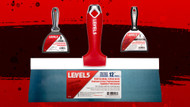Stainless Steel Versus Carbon Steel Drywall Tools
Author: Lucas H
Publish Date: September 21, 2021
On social media and in conversations with drywall finishers we often are asked, “What's the difference between carbon and stainless steel hand tools”? In this video, LEVEL5 President Scott Murray lays down the facts.
At LEVEL5 Tools, we manufacture one of the widest ranges of drywall tools in the world. When looking at the options available for drywall hand tools, one of the main choices to be made is in steel type. We offer carbon steel, blue steel and stainless steel variants of our joint knives and taping knives.
So, what is the main difference? In short, oxidization properties. Carbon steel (including blue steel) has a greater level of flexibility and offers more precision (in the right hands) but will naturally rust with use. Alternatively, stainless steel offers a higher degree of resistance to rust & corrosion. If you’re willing to actively take care of your carbon and blue steel taping or joint knives (i.e. clean, dry, lubricate and store vertically) after each use, then your drywall tools should stay in great shape. However, if you’re someone that would prefer to give their drywall tools a quick rinse before tossing them in your toolbox then you should opt for stainless steel.
On social media and in conversations with drywall finishers we often are asked, “What's the difference between carbon and stainless steel hand tools”? In this video, LEVEL5 President Scott Murray lays down the facts.
At LEVEL5 Tools, we manufacture one of the widest ranges of drywall tools in the world. When looking at the options available for drywall hand tools, one of the main choices to be made is in steel type. We offer carbon steel, blue steel and stainless steel variants of our joint knives and taping knives.
So, what is the main difference? In short, oxidization properties. Carbon steel (including blue steel) has a greater level of flexibility and offers more precision (in the right hands) but will naturally rust with use. Alternatively, stainless steel offers a higher degree of resistance to rust & corrosion. If you’re willing to actively take care of your carbon and blue steel taping or joint knives (i.e. clean, dry, lubricate and store vertically) after each use, then your drywall tools should stay in great shape. However, if you’re someone that would prefer to give their drywall tools a quick rinse before tossing them in your toolbox then you should opt for stainless steel.




